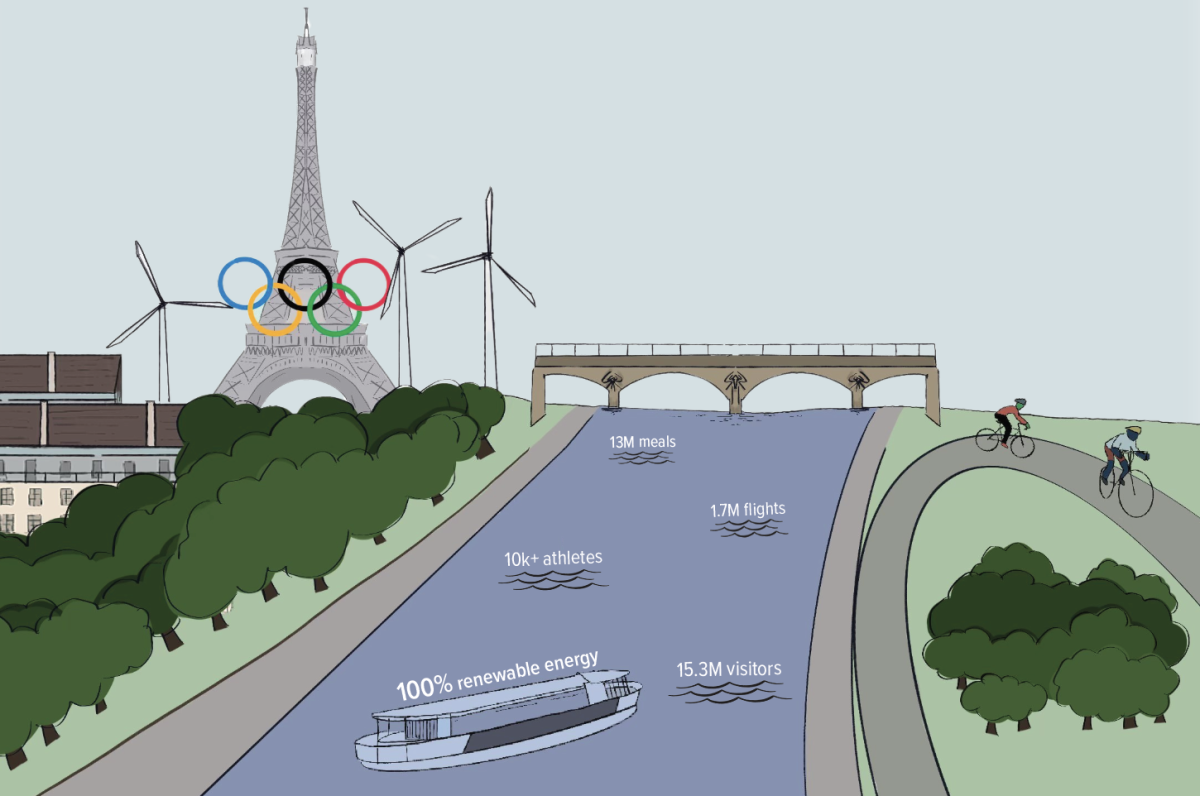In the sports world, sustainability is a buzzword. Practically every major sporting event now features a sustainability statement containing generic eco-friendly pledges. The 2024 Paris Olympics, touted by organizers as the “greenest ever Games,” likewise promised numerous policies to reduce environmental impact. But are these measures truly effective, or are they simply a marketing façade?
The Paris Olympics has faced accusations of “greenwashing”: presenting itself as environmentally friendly through deceptive marketing instead of genuinely committing to sustainable practices. By emphasizing eye-catching initiatives, organizers can deflect public scrutiny while avoiding the difficult reforms necessary for meaningful environmental change.
“People want to present themselves as being sustainable, less harmful to the planet,” upper school environmental science teacher Jeff Sutton said. “That’s going to make people more relaxed and enjoy the event more, maybe sponsor it more. So you have to at least attempt to put on some presentation of caring about the planet and the future and the carbon footprint and the energy consumption.”
It comes as no surprise that organizers want to appear climate-conscious given the sports world’s long history of negative environmental impact. The 2022 FIFA World Cup generated 3.63 million tons of carbon dioxide and the 2012 London Olympics and the 2016 Rio Olympics each produced about 3.5 million tons, similar to the carbon emission of the entire city of New York in two weeks.

The vast amount of greenhouse gas emissions stems from the construction and maintenance of huge new stadiums, food production for millions of spectators and competitors and international travel from all over the world. The Olympics, which hosts over 60 sports and thousands of athletes over three weeks, ranks among the highest in emissions.
“It’s just the main issue of trying to cram millions of people into one tiny city,” Green Team Co-President Eric Zhang (12) said. “For the Olympics, they use cities like Paris or LA that are so metropolitan, and then people are flying from around the globe, so you have all the plane emissions coming in. Just a ton of waste, trying to free up space, making stadiums can also be a big issue, or just getting people to hotels. It’s all a big mess.”
This year’s Olympics vowed to halve the carbon footprint to 1.75 million tons. To achieve this, organizers used 100% renewable energy sourced locally, decreasing the use of temporary diesel generators. The Games also utilized preexisting and temporary infrastructure for 95% of their venues in order to minimize constructing buildings specifically for the Games.
Additionally, the Olympics implemented sustainable food practices, including serving mostly plant-based food for spectators and limiting the use of single-use plastics in catering. Organizers made extensive use of public transportation to transport athletes and audience members.
Some of the new policies, however, stirred controversy. In an effort to reduce CO2 emissions, organizers planned to replace traditional air conditioning units in the Olympic Village with geothermal cooling. But after several teams raised concerns about athletes struggling to sleep amidst a heat wave, organizers permitted the installation of air conditioning units for a fee.
To avoid the construction of a new swimming stadium, organizers decided to hold two Olympics swimming events in the Seine River, which has historically been unsafe for swimming due to high bacteria levels. Despite France’s €1.6 billion plan to clean the waters leading up to the Olympics, the Seine continued to fail bacteria tests. The two events ultimately took place in the river after canceled training events, but four athletes acquired gastrointestinal diseases after competing.
Green Team member and soccer athlete Stella Yang (11) believes that although sustainability initiatives are crucial, the organizing committee should have prioritized the health of the competitors.
“Especially with some questionable plans like replacing ACs which may cause discomfort for athletes, I don’t know how effective these strategies are,” Stella said. “They seem like something easy to do to appear environment-conscious while avoiding more large-scale reforms.”
Separately, organizers planned to construct a new aluminum judging platform for the surfing event in Tahiti. The project faced intense criticism from locals due to concerns about damage to the native coral reefs. Protests and an online petition with over 250,000 signatures to stop the construction caused it to be scaled back.
Although some of the Paris Olympics’ policies are a step forward from previous events, the question remains of whether the Olympics can ever truly be “green”.
“The goal of the event is not for sustainability, it’s for competition,” Sutton said. “That means lots of focus on the event, not so much focus on being sustainable. You want to make it convenient, and convenience usually means less focus on the carbon footprint, the plastic use. It’s really difficult to be both sustainable and immediate.”
According to Carbon Market Watch, a nonprofit organization that monitors climate policies, the Olympics has made a “decent” effort in implementing sustainable policies, but their plan lacks transparency and fails to provide detailed methodologies for achieving their goals as well as rigorous monitoring to ensure those goals are met. The inconsistencies between the Olympics’ public marketing and internal supervision limit their ability to promote sustainable practices in other events.
In a future low-carbon world, the Olympics are under scrutiny. Some argue that to truly become environmentally friendly, the Olympics must fundamentally reduce its size and scope or decentralize. By distributing the event over several countries at once, the scale of the Games and international travel would decrease while improving access for local spectators.
“It’s hard to enforce policies on a huge event that’s just a few days or a few weeks long,” Eric said. “It’s more important to focus on having strong climate policy normally. But it is also important, when you have big events, that climate stuff is kept in mind, just so people who are there can start to think about it and become more accountable for their actions.”


















![“[Building nerf blasters] became this outlet of creativity for me that hasn't been matched by anything else. The process [of] making a build complete to your desire is such a painstakingly difficult process, but I've had to learn from [the skills needed from] soldering to proper painting. There's so many different options for everything, if you think about it, it exists. The best part is [that] if it doesn't exist, you can build it yourself," Ishaan Parate said.](https://harkeraquila.com/wp-content/uploads/2022/08/DSC_8149-900x604.jpg)




![“When I came into high school, I was ready to be a follower. But DECA was a game changer for me. It helped me overcome my fear of public speaking, and it's played such a major role in who I've become today. To be able to successfully lead a chapter of 150 students, an officer team and be one of the upperclassmen I once really admired is something I'm [really] proud of,” Anvitha Tummala ('21) said.](https://harkeraquila.com/wp-content/uploads/2021/07/Screen-Shot-2021-07-25-at-9.50.05-AM-900x594.png)







![“I think getting up in the morning and having a sense of purpose [is exciting]. I think without a certain amount of drive, life is kind of obsolete and mundane, and I think having that every single day is what makes each day unique and kind of makes life exciting,” Neymika Jain (12) said.](https://harkeraquila.com/wp-content/uploads/2017/06/Screen-Shot-2017-06-03-at-4.54.16-PM.png)








![“My slogan is ‘slow feet, don’t eat, and I’m hungry.’ You need to run fast to get where you are–you aren't going to get those championships if you aren't fast,” Angel Cervantes (12) said. “I want to do well in school on my tests and in track and win championships for my team. I live by that, [and] I can do that anywhere: in the classroom or on the field.”](https://harkeraquila.com/wp-content/uploads/2018/06/DSC5146-900x601.jpg)
![“[Volleyball has] taught me how to fall correctly, and another thing it taught is that you don’t have to be the best at something to be good at it. If you just hit the ball in a smart way, then it still scores points and you’re good at it. You could be a background player and still make a much bigger impact on the team than you would think,” Anya Gert (’20) said.](https://harkeraquila.com/wp-content/uploads/2020/06/AnnaGert_JinTuan_HoHPhotoEdited-600x900.jpeg)

![“I'm not nearly there yet, but [my confidence has] definitely been getting better since I was pretty shy and timid coming into Harker my freshman year. I know that there's a lot of people that are really confident in what they do, and I really admire them. Everyone's so driven and that has really pushed me to kind of try to find my own place in high school and be more confident,” Alyssa Huang (’20) said.](https://harkeraquila.com/wp-content/uploads/2020/06/AlyssaHuang_EmilyChen_HoHPhoto-900x749.jpeg)






